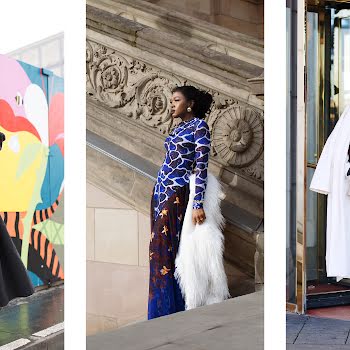
By Erin Lindsay
29th Jan 2020
29th Jan 2020
The city has fast become one of the unlikeliest fashion capitals of the world, and now Copenhagen Fashion Week is setting the sustainability example
While many old-school fashion followers deem the first day of New York Fashion Week as the official kick-off to fashion month, younger, Instagram-led style mavens are increasingly led by new season offerings of further astray. Copenhagen Fashion Week officially launched this week, in what has become, over the past five years, an unignorable contender for fashion capital of the social-media-driven world.
Brands like Ganni, Cecilie Bahnsen and Stine Goya, who implicitly understand the power of a stand-out moment that will do well on Insta-stories (versus an entire considered collection) have broken into the mainstream and given us some of the key trends of the past few years — Cecilie Bahnsen, for example, being responsible for the explosion of puff-sleeved, trapeze dresses last year that have taken over everywhere from Sister Jane to Zara (and that we’re sure to see plenty of this month via street style).
Sustainability action
Now, the Danish city has taken its leadership to the next level, with the announcement of some hefty plans to bring its bi-annual sartorial celebrations to a more sustainable point. The event announced it is launching a three-year sustainability action plan, with a focus on curbing the week’s excessive carbon footprint and setting the benchmark for other, more established fashion events to hopefully follow suit.
Copenhagen Fashion Week not only plans to drastically reduce its own footprint, with a reduction in emissions and a zero-waste policy, but it will also place a notice on brands to meet set sustainability targets within three years or they will not be allowed to show at fashion week.
These targets require brands to make big changes in order to keep their place at the increasingly popular Copenhagen hub — among other requirements, brands have to demonstrate that at least 50% of their garments are made with sustainable materials; they will be disqualified if they destroy unsold clothes; and they will have to build more sustainable practices into their workplace conditions, materials choices and show design.
Increasing anger
The announcement comes after international fashion weeks came under increasing fire for their lack of action on climate change. The fashion industry is the second biggest polluter in the world, and although fashion weeks only represent a fraction of the damage done, they have become a target for protest. Last September, climate action group Extinction Rebellion staged a number of protests at London Fashion Week, calling for the event to be cancelled.
The urgency of climate action has already begun to trickle down to consumer level, with many of our favourite high street stores now investing in sustainable collections and materials. Copenhagen’s efforts to have these changes emulated at the top levels of the industry is a great step in tackling global sustainability in fashion.
Featured image: Jason Lloyd Evans
Read more: 10 of the best outfits I’ve saved on Instagram this week
Read more: ’70s florals are all I want to wear this year, and I’m starting with these 15 pieces
Read more: 5 stylish trends I’m stealing from the boys at Paris Men’s Fashion Week























